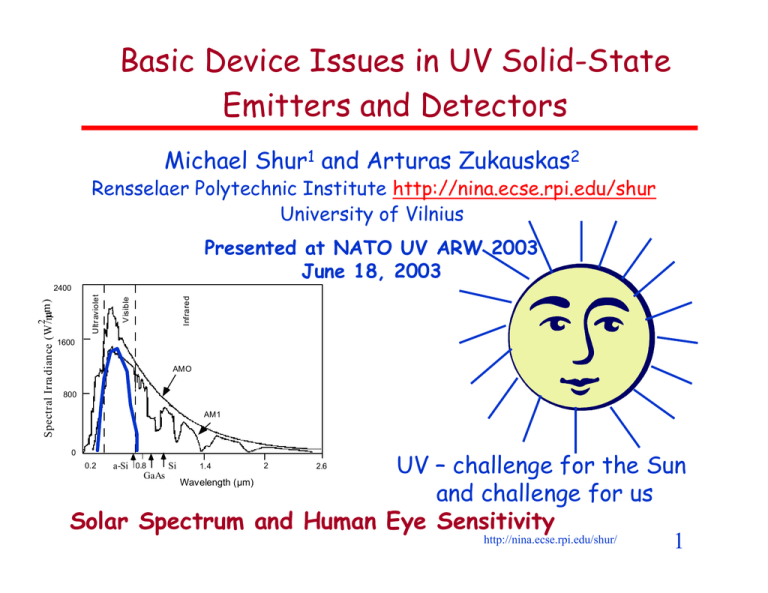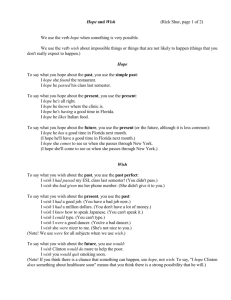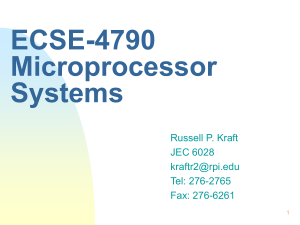K03_SHUR_ZUKAUSKAS.PDF
advertisement

Basic Device Issues in UV Solid-State Emitters and Detectors Michael Shur1 and Arturas Zukauskas2 Rensselaer Polytechnic Institute http://nina.ecse.rpi.edu/shur University of Vilnius Presented at NATO UV ARW 2003 June 18, 2003 Infra re d V isib le Ultr avio let 2 µm) Spectral Irra diance (W/m 2400 1600 AMO 800 AM1 UV – challenge for the Sun and challenge for us Solar Spectrum and Human Eye Sensitivity http://nina.ecse.rpi.edu/shur/ 1 0 0.2 a-Si 0.8 Si GaAs . .. 1.4 Wavelength (µm) 2 2.6 Lecture Outline • UV range and applications • Nitride based UV LEDs • Solar blind photodetectors http://nina.ecse.rpi.edu/shur/ 2 Black Body Spectrum vs Temperature http://nina.ecse.rpi.edu/shur/ 3 UV Applications (for 250 nm – 340 nm) Sensing and beyond o o o o o o o o o o o o o Bio-agent detection Water/air purification Biology Sterilization Medicine/dentistry Solid-state white lighting Short-range secure communications Dense data storage Ballistic missile defense Photo-catalytic reactions Semiconductor manufacturing Displays EEPROM erasing UV-LED Based Fluorimeter with Integrated Lock-in Amplifier (after Prof. Zukauskas, U of V, Lithuania) http://nina.ecse.rpi.edu/shur/ 4 Medical Applications: Example • Seasonal affective disorder affects many people (up to 10%)in the northern latitudes • Bright white light is known to treat SAD Applications of U of V/RPI/SET quadrichromatic Versatile Solid-State Lamp: Phototherapy of seasonal affective disorder at Psychiatric Clinic of Vilnius University • The exact mechanism of treatment is not known • Optimization of Spectral Power Distribution might help treatment Add UV? http://nina.ecse.rpi.edu/shur/ 5 IR, Visible, and UV Range UVC 100-280 nm UVB UVA 280-315 315-400 nm nm UV radiation Visible radiation (light) Infrared radiation (IR) VISIBLE IR THz 100 -400 nm 400 - 760 nm > 760 nm http://nina.ecse.rpi.edu/shur/ 6 UV LED Advantages compared to UV Lamps • • • • • • • • Lower power consumption Longer life Compactness Sharper spectral lines Variety of UV spectra Shape and form factor flexibility Ruggedness Can generate white light with high CRI and high efficacy • Enables quantum phosphor applications http://nina.ecse.rpi.edu/shur/ 7 SEMICONDUCTOR MATERIALS SYSTEMS FOR UV APPLICATIONS 2000 AlN C ZnS GaN ZnO SiC(4H) SiC(6H) ZnSe CdS AlP CdO SiC(3C) GaP ZnTe AlAs InN CdSe AlSb CdTe GaAs InP Si GaSb Ge InAs InSb 0 800 600 500 400 300 200 1 UV IR 1 2 3 4 5 6 7 Band Gap Energy (eV) http://nina.ecse.rpi.edu/shur/ 8 Efficient luminous Intensity in Nitrides 10 Better AlInGaP InGaN AlGaAs 1 Luminous Intensity GaP:N 0.1 GaAsP GaAsP SiC Worse 0.01 400 450 500 550 600 650 700 Wavelength (nm) After R. Karlicek, presented at Blue Semi, Dallas, TX, June 11 (2003) http://nina.ecse.rpi.edu/shur/ 9 GaN pioneers Jacques Pankove (right) and Paul Maruska Jacques Pankove (left) and I. Akasaki Shuji Nakamura http://nina.ecse.rpi.edu/shur/ 10 First Commercial UV LED from CREE (July 2001) • Cree introduced the first UV LED for use in the illumination market in July 2001 (12 mW, 405 nm and 395 nm UV (InGaN on SiC substrate) devices). These LEDs have a geometrically enhanced vertical chip structure to maximize light extraction efficiency and require only a single wire bond connection. http://nina.ecse.rpi.edu/shur/ 11 Nichia UV LEDs Type Product (mm) Number Φ5 Φ5 Peak Optical Forward Wavelength Power Output Voltage (nm) (µW) Vf (V) Typ. NSHU550 375 700 3.5 NSHU590 375 700 3.5 After http://www.nichia.co.jp/product/led.html http://nina.ecse.rpi.edu/shur/ 12 32 lumens 23 lumen/W 3500 K color temperature 80 CRI USC/SET UV-based LEDs 275 nm – 340 nm Output power, mW • • • • Gelco Packaged UV-based White LED 10 1 dc 100 mA 0.1 270 From: pulse 1A 280 290 300 310 320 330 340 350 Wavelength, nm A. Chitnis, V. Adivarahan, J. Zhang, M. Shatalov, S. Wu, J. Yang, G. Simin, M. Asif Khan, X. Hu, Q. Fareed, R. Gaska, and M. S. Shur, Milliwatt power AlGaN quantum well deep ultraviolet Light emitting diodes, physics status solidi (2003), to be published http://nina.ecse.rpi.edu/shur/ 13 Solid State Lighting - To probe further: Book A. Žukauskas, M. S. Shur, and R. Gaska, Introduction to Solid State Lighting, John Wiley and Sons, 2002, ISBN: 0471215740 Reviews/chapters: A. Žukauskas, R. Vaicekauskas, F. Ivanauskas, M. S. Shur and R. Gaska, Optimization of white all-semiconductor lamp for solid-state lighting applications, in in Frontiers in Electronics: Future Chips Proceedings of the 2002 Workshop on Frontiers in Electronics (Wofe-02) St. Croix, Virgin Islands, World Scientific Pub Co; (January 15, 2003), R. Gaska, A. Žukauskas, M. S. Shur, and M. A. Khan, Progress in III-nitride based white light sources, in SPIE Proceedings, to be published (Invited paper) A. Žukauskas, M. S. Shur, and R. Gaska, Solid State Lighting, in: Future Trends in Microelectronics: The Nano Millennium, New York: Wiley, 2002, S. Luryi, J. M. Xu, and A. Zaslavsky, eds. A. Žukauskas, M. S. Shur, and R. Gaska, Light-emitting diodes: progress in solid-state lighting, MRS Bulletin, pp. 764-769, October (2001) A. Žukauskas, M. S. Shur, R. Gaska, Solid-State Lamps, McGraw Hill Technical Encyclopedia E-mail: shurm@rpi.edu M. Asif Khan, J. Yang, G. Simin, R. Gaska, and M. S. Shur, Strain energy band engineering approach to AlN/GaN/InN heterojunction devices, pp. 195-214, in Frontiers in Electronics: Future Chips Proceedings of the 2002 Workshop on Frontiers in Electronics (Wofe-02) St. Croix, Virgin Islands, World Scientific Pub Co; (January 15, 2003), http://nina.ecse.rpi.edu/shur/ 14 Issues in Solid State UV emitters: Merging Micro and Nano Scales for Sensing Micro scale: link Nanoscale: link LED layer heterostructure to light generation structure to light extraction p-Al0.15Ga0.85N aN n-Al0.15Ga0.85N (a) Sensing and Related Applications (b) (c) (d) (e) (f) p-GaN 0.05 µm UV-LED Based Fluorimeter with Integrated Lock-in Amplifier (U of V, Lithuania/SET, Inc.)) In0.23Ga0.77N http://nina.ecse.rpi.edu/shur/ 15 6.0 350 5.0 300 250 4.0 Al Ga N 0.3 0.7 3.0 0.0 0.2 0.4 0.6 0.8 Al mole fraction 200 1.0 Emission Wavelength (nm) Band gap (eV) III-Nitride AlxGa1-xN UV Emitters require high Al molar fraction (X) AlGaN heterostructures involve strain and polarization: Possible solutions: use •Homoepitaxy •Strain Energy Band Engineering •PALE •Non-polar substrates •Thermal and current management http://nina.ecse.rpi.edu/shur/ 16 Bulk GaN and AlN substrates have become available! • North Coast Crystals, Inc.: Commercial Scale Production of Bulk, Polycrystalline Group III Nitrides • Sanders, bulk nitrides (ATP) • High Pressure Research Center in Warsaw • Bulk GaN and AlN at TDI, Inc. • Sakai: Combining the ELO technology on MOVPE templates, thick GaN layers (up to 500µm ) Samsung • Sumimoto (GaN) • Crystal IS (AlN) • NCSU (AlN) • Kansas State: sublimation (AlN) When large area high quality AlN and GaN will become available? Which devices will emerge to take advantages of bulk substrates? http://nina.ecse.rpi.edu/shur/ 17 Advantages of AlN Substrates • Nitride substrate (AlN homoepitaxy -”no” defects) • “Natural” cladding/waveguiding layer • High thermal conductivity Disadvantages • • • < 250 nm UV Laser (?) Insulating (good for RF but bad for LEDs) Small size High cost http://nina.ecse.rpi.edu/shur/ 18 Cost of Light Fluorescent tubes: lumen per dollar 100 White LED: lumen per dollar 4 (Lumileds) 1.5 (Nichia) •Incandescent bulbs: lumen per dollar 1100 UV LEDs – If you ask, you cannot afford it http://nina.ecse.rpi.edu/shur/ 19 2 Hall mobility µ H(cm /Vs) 6x10 4 5x10 4 4x10 4 3x10 4 2x10 4 1x10 4 High 2DEG mobility for homoepitaxial GaN This w ork G aN /saphir [4] G aN /6H -S iC [3] A l 0.13 G a 0.87 N : 20 nm n-type G aN : 1 µm M g-doped G aN crystal 150 µm (a) carrier density n H*10 12 -2 (cm ) 24 22 20 E. Frayssinet, W. Knap, P. Lorenzini, N. Grandjean, J. Massies, C. Skierbiszewski, T. Suski, I. Grzegory, S. Porowski, G. Simin, X. Hu, M.Asif Khap, M. Shur, R. Gaska, and D. Maude, Applied Physics Letters, October 16, 2000; R. Gaska, J. W. Yang, A. Osinsky, Q. Chen,M. Asif Khan, A. O. Orlov, G. L. Snider, M. S. Shur, Appl. Phys. Lett., Feb. 1999 110 µm 18 16 150 µm 14 10 µm 630 µm 12 10 8 6 4 2 (b) 0 1 10 > 60,000 cm2/V-s at low T 100 Tem perature (K ) - Fig. 1 - http://nina.ecse.rpi.edu/shur/ 20 GaN-based HFETs on bulk GaN substrates gm(mS/mm) 160 SiC bulk GaN Sapphire 140 From M. Asif Khan and J. W. Yang, W. Knap, E. Frayssinet, X. Hu and G. Simin, P. Prystawko, M. Leszczynski, I. Grzegory, S. Porowski, R. Gaska, M. S. Shur, B. Beaumont, M. Teisseire, and G. Neu, GaN-AlGaN Heterostructure Field Effect Transistors Over Bulk GaN Substrates, Appl. Phys. Lett. 76, No. 25, pp. 3807, 3809, 19 June (2000) 120 100 80 60 Vds= +10V 40 20 0 -10 -8 -6 -4 -2 0 2 Vgs (V) http://nina.ecse.rpi.edu/shur/ 21 Use bulk AlN for high molar fraction AlGaN Single Crystal Bulk AlN from Crystal IS, Inc. 8mm 0.7 VG=0V, 1V 0.6 VG=-2V -2.0 VG=-3V 0.5 VG=-4, -5V -4.0 VG=0V -6.0 0.4 VG=-1V 0.3 0.2 VG=-2V 0.1 0.0 0.0 VG=-3V VG=-4V 0 2 4 6 Drain Bias 8 10 VDS (V) 12 -8.0 Gate Leakage Current (µA/mm) Room Temperature Hall Data: µH = 1,100 cm2/Vs ns = 1013 cm-2 Drain Current ID (A/mm) 8mm -10.0 -12.0 -14.0 From X. Hu, J. Deng, N. Pala, R. Gaska, M. S. Shur, C. Q. Chen, J. Yang, S. Simin, and A. Khan, C. Rojo, L. Schowalter, AlGaN/GaN Heterostructure Field Effect Transistor on Single Crystal Bulk AlN, Appl. Phys. Lett, 82, No 8, 24 Feb (2003) http://nina.ecse.rpi.edu/shur/ 22 UV LED on Bulk AlN From http://www.parc.xerox.com/company/pressroom/news/2002-04-10-uvled/default.html April 2002 http://nina.ecse.rpi.edu/shur/ 23 PL Intensity (arb. units) 5 nm Al0.5Ga0.5N 20 nm AlN AlN epilayer Bulk AlN substrate substrate SiC substrate 240 260 280 300 Luminescence intensity (arb. units) AlN/AlGaN Room Temperature Photoluminescence PL from edge @ L = 400 µm PL from edge @ L = 440 µm spontaneous PL 320 Wavelength (nm) PL signal from MQWs on bulk AlN is approximately 28 times stronger compared to the structure grown over SiC. From R. Gaska, C. Chen, J. Yang, E. Kuokstis, A. Khan, G. Tamulaitis, I. Yilmaz, M. S. Shur, J. C. Rojo, L. Schowalter, . Deep-ultraviolet emission of AlGaN/AlN quantum wells on bulk AlN, accepted at APL 240 260 280 300 Wavelength (nm) Stimulated emission at 258 nm. From R. Gaska, C. Chen, J. Yang, E. Kuokstis, A. Khan, G. Tamulaitis, I. Yilmaz, M. S. Shur, J. C. Rojo, L. Schowalter, . Deep-ultraviolet emission of AlGaN/AlN quantum wells on bulk AlN, accepted at APL http://nina.ecse.rpi.edu/shur/ 24 Use Strain Energy band Engineering Use strain controlling superlattices Use AlGaInN - quaternary Thickness, nm Lattice mismatch (A) Band Offset (eV) 60 3 50 2 40 1 0 30 AlGaN 0.2 0.4 0.6 0.8 1 InGaN -1 -2 20 10 0 0 0.2 0.4 0.6 0.8 1 Al Mole Fraction 0.1 AlGaN 0 0.2 0.4 0.6 0.8 -0.1 -0.2 InGaN Critical thickness as a function of Al mole fraction in AlxGa1-xN/GaN: superlattice (solid line), 1 SIS structure (dashed line). From A. D. Bykhovski, B. L. Gelmont, and M. S. Shur, J. Appl. Phys. 81 (9), 6332-6338 (1997) -0.3 -0.4 Molar Fraction of Al and In http://nina.ecse.rpi.edu/shur/ 25 Use PALE or MEMO CVD instead of MOCVD Conventional MOCVD on TMA NH3 on PALE TMA on NH3 off on off t MOCVD AlN t PALE AlN http://nina.ecse.rpi.edu/shur/ 26 MEMO Epitaxy Machines at SET, Inc http://nina.ecse.rpi.edu/shur/ 27 Ultimate heteroepitaxy: blue LED on Si Courtesy of SET, Inc. http://nina.ecse.rpi.edu/shur/ 28 Band Diagram of UV LED MQW p-type Strain Compensating Layer n-type http://nina.ecse.rpi.edu/shur/ 29 Use SL strain relief layer High Al-content AlGaN Layers over Sapphire SL-buffer 100 5 80 4 3.0 µm HT-Al0.2Ga0.8 N 1.5 µm 2 µm AlN/AlGaN SL HT-Al0.2Ga0.8 N 0.2 µm LT -ALN sapphire LT -ALN 60 crack-free over SL 3 3.0 µm 2.2 µm 1.5 µm 4000 PL intensity (a.u.) n+-Al0.2Ga0.8 N Transmission (%) 5000 40 3000 1000 1 20 0 sapphire 290 300 200 310 320 330 340 Wavelength (nm) 0 J. P. Zhang, et.al, Appl. Phys. Lett, 80, 3542 (2002) 2 cracked 1.2 µm 1.0 µm 2000 RT PL intensity (a.u.) HT-AlN buffer 300 400 500 600 700 350 0 800 Wavelength (nm) http://nina.ecse.rpi.edu/shur/ 30 Use non-polar substrates Room Temperature Photoluminescence of AlN a-face – advantage for light emitters (no polarization field) 6000 5.9 eV PL Intensity (a.u.) Excimer laser (193 nm) excitation 2 P = 2 MW/cm 4000 c-face: 6o off-axis a-face: 3o off-axis a-face c-face Laser 2000 0 200 250 300 Wavelength (nm) 350 Courtesy Asif Khan, USC http://nina.ecse.rpi.edu/shur/ 31 Sub-milliwatt power 285 nm Emission UV LED on Sapphire. 30 14 Rs~70-80 Ω 20 10 15 10 p-AlGaN 5 SQW 0 RT dc 12 Power, µW p+-GaN Current, mA 25 8 6 4 2 0 2 4 n+-AlGaN buffer 6 0 8 0 40 60 80 100 400 500 Current, mA Voltage, V SL 0.20 LT-AlN RT pulse 500 ns, 0.5% 285.5 nm 200 mA pulsed pumping 500 ns, 10 kHz Power, mW Intensity, a.u. 0.15 Sapphire 20 0.10 0.05 0.00 260 280 300 320 340 360 380 Wavelength, nm 400 420 0 100 200 300 Current, mA V. Adivarahan, S. Wu, A. Chitnis, R. Pachipulusu, V. Mandavilli, M. Shatalov, J. P. Zhang, M. Asif Khan, G. Tamulaitis, A Sereika, I. Yilmaz, M. S. Shur, and R. Gaska, AlGaN Single Quantum Well Light Emitting Diodes with Emission at 285 nm, Appl. Phys. Lett., Vol. 81, Issue 19, pp. 3666-3668 (2002) http://nina.ecse.rpi.edu/shur/ 32 Improved Thermal and Current crowding management Square geometry Inter-digitated fingers LED arrays 50 50 Multifinger LED 40 Current, mA Current, mA 40 30 20 Square LED 4 x 1 array 30 Single chip 20 10 10 0 0 2 4 6 8 10 Voltage, V 12 14 0 0 2 4 6 8 10 Voltage, V A. Chitnis et al., Jpn. J. Appl. Phys. Lett., 41, L320 (2002) http://nina.ecse.rpi.edu/shur/ 33 USC/SET UV LED for solid state lighting and homeland security 50 Normalized intensity, a.u. 40 Current, mA 340 nm LED 30 325 nm LED 20 280 nm LED 10 0 0 2 278 nm 4 6 8 10 From: 9nm 240 260 280 300 320 340 360 380 400 420 440 EQE, % 0.2 0 200 400 600 800 1000 Current, mA 5 Output power, mW Power, mW 340 nm 325 nm 280 nm 0.4 0.0 10 10.2nm Wavelength, nm 0.6 15 8.5nm RT 500 ns 10 kHz Voltage, V 20 325 nm 338 nm 10 1 A. Chitnis, V. Adivarahan, J. Zhang, M. Shatalov, S. Wu, J. Yang, G. Simin, M. Asif Khan, X. Hu, Q. Fareed, R. Gaska, and M. S. Shur, Milliwatt power AlGaN quantum well deep ultraviolet Light emitting diodes, physics status solidi (2003) To be published pulse 1A dc 100 mA 0.1 0 0 200 400 600 Current, mA 800 1000 270 280 290 300 310 320 330 340 350 Wavelength, nm http://nina.ecse.rpi.edu/shur/ 34 UV Photodetectors http://nina.ecse.rpi.edu/shur/ 35 Photoconductive Detectors Ec Cr/Au Excit on level hω E – – p-type GaN Sapphire (0001) Accept or level v + Cr/Au Ti/Au 200 - 1000 micron From M. S. Shur and M. A. Khan, GaN/AlGaN Heterostructure Devices: Photodetectors and Field Effect Transistors, MRS Bulletin, Vol. 22, No. 2, pp. 44-50, Feb. (1997) http://nina.ecse.rpi.edu/shur/ 36 Solar Blind Photodetectors ohmic transparent Schottk y Schottky photoconductive GaN photoconductive AlGaN n-GaN i-GaN n-AlGaN p-GaN transparent Schottky contact p-n junc tion Metal-Semiconductor-Metal optoelectronic HFET p-i-n junction From M. S. Shur and M. A. Khan, GaN/AlGaN Heterostructure Devices: Photodetectors and Field Effect Transistors, MRS Bulletin, Vol. 22, No. 2, pp. 44-50, Feb. (1997) http://nina.ecse.rpi.edu/shur/ 37 Transparent Schottky Barrier GaN Photodetector Schottky 0 .2 0 Contacts n--GaN 0 .1 0 n+-GaN 0 .0 0 Sapphire 2 00 3 00 4 00 5 00 6 00 Wav el en g t h ( nm ) From Q. Chen, J. W. Yang, A. Osinsky, S. Gangopadhyay, B. Lim, M. Z. Anwar, Appl. Phys. Lett., (1996) http://nina.ecse.rpi.edu/shur/ 38 Transparent Schottky Barrier AlGaN Photodetector Schottky Ohmic n- -Al 0.26 Ga0.74 N Ohmic n+ -Al 0.26 Ga0.74 N Sapphire B. W. Lim, Q. Chen, M. A. Khan, C. J. Sun, J. Yang, High Responsivity Intrinsic Photoconductors Based on AlxGa1-xN, Appl. Phys. Lett., 68 (26), pp. 3761-3762 (1996) http://nina.ecse.rpi.edu/shur/ 39 P-n junction GaN Photodetectors Ohmic contacts Ohmic contacts p-GaN n-GaN n-GaN p- GaN Sapphire Sapphire Light Light -2 0 2 Voltage (V) After Q. Chen, M. A. Khan, C. G. Sun, and J. W. Yang, Electronics Letters, 31, p. 1781 (1995) http://nina.ecse.rpi.edu/shur/ 40 GaN MSM After M. S. Shur, Introduction to Electronic Devices, Wiley, New York, 1996 80 Light beam 60 40 Interdigitated Schottky contacts 20 -12 -8 0 -4 -20 4 8 12 Voltage (V) -40 Semiconductor -60 -80 A. Khan, Q. Chen, S. D. Kuksenkov, S. Gangopadhyay, and H. Temkin, unpublished (1997) http://nina.ecse.rpi.edu/shur/ 41 Gated AlGaN/GaN Photodetector Source Gat e Dr ain 1.6 Dark Illumination n-AlGaN n- GaN i - GaN Sapphire 1.2 0.8 0.4 -4 -3 -2 -1 00 Gate voltage (V) Illuminat ion M. A. Khan, M. S. Shur, Q. Chen, J. N. Kuznia, and C. J. Sun, Gated Photodetector Based on GaN/AlGaN Heterostructure Field Effect Transistor, Electronics Letters, vol. 31, No. 5, pp. 398-400, March 2, (1995) http://nina.ecse.rpi.edu/shur/ 42 Measured spectral responsivity of AlGaN/GaN optoelectronic HFET 100.00 10.00 1.00 0.10 150 200 250 300 350 400 Wavelength (µm) M. A. Khan, M. S. Shur, Q. Chen, J. N. Kuznia, and C. J. Sun, Gated Photodetector Based on GaN/AlGaN Heterostructure Field Effect Transistor, Electronics Letters, vol. 31, No. 5, pp. 398-400, March 2, (1995) http://nina.ecse.rpi.edu/shur/ 43 Emissive GaN Photodetectors: Band diagram of p-type GaN near the surface for negative electron affinity (a) and positive electron affinity (b) assuming c = 1 eV Evac E = χ +Ec 4 E = Ec Ec Evac 4 χ Ec χ 2 2 Eg 0 Eg Ev EF 0 100 Distance (Å) (a) 200 Ev EF 100 200 Distance (Å) (b) http://nina.ecse.rpi.edu/shur/ 44 Typical Responsivities 0.3 p-GaN Khan et al. (1993) SiC Edmond et al. (1993) 0.2 Si Chen et al. (1995) GaN Chen et al. (1997) 0.1 GaN array Lim et al. (1997) 0 200 250 300 350 Wavelength (nm) From M. S. Shur and M. A. Khan, GaN and AlGaN Devices: Field Effect Transistors and Photodetectors, Gordon and Breach Science Publishers, Series Optoelectronic Properties of Semiconductors and Superlattices, Vol. 7, pp. 47-92, S. Pearton, Editor http://nina.ecse.rpi.edu/shur/ 45 Detectivity The quantitative measure of the detector sensitivity is the Noise Equivalent Power (NEP), which is defined as the incident RMS optical power required in order to obtain signal-to-noise ratio of 1 in a bandwidth of 1 Hz. NEP is given by 2 NEP = in / R where is the noise current, and R is the detector responsivity. The related characteristic is detectivity: D* = SB NEP where B is the bandwidth and S is the detector area. For infrared detectors, the maximum detectivity is limited by the background radiation. Such detectors are called Background Limited Infrared Photoconductor (BLIP) detectors. http://nina.ecse.rpi.edu/shur/ 46 Detectivity Limits Signal Fluctuation Limit 19 10 17 10 77 K 15 10 300 K 13 Dblip 10 1000 K 11 10 9 10 1 10. 100. Wavelength (micron) From M. S. Shur and M. A. Khan, GaN/AlGaN Heterostructure Devices: Photodetectors and Field Effect Transistors, MRS Bulletin, Vol. 22, No. 2, pp. 44-50, Feb. (1997) http://nina.ecse.rpi.edu/shur/ 47 Typical Responsivities Curves a, b, c, and d correspond to AlxGa1-xAs with x = 0.61, 0.55, 0.46, and 0.05 respectively 300 c 200 b d 100 (x10) a 200 300 400 Wave length (nm) From M. S. Shur and M. A. Khan, GaN/AlGaN Heterostructure Devices: Photodetectors and Field Effect Transistors, MRS Bulletin, Vol. 22, No. 2, pp. 44-50, Feb. (1997) http://nina.ecse.rpi.edu/shur/ 48 In co-doped AlGaN epilayer with 40% of Al 60 40 20 260 270 280 290 300 Transmitivity (%) PL Intensity (arb. units) 80 0 310 Wavelength (nm) V. Adivarahan, G. Simin, G. Tamulaitis, R. Srinivasan, J. Yang, and M. Asif Khan, M. S. Shur, R. Gaska, S. L. Rumyantsev, and N. Pala, Indium-Silicon Co-Doping of High Aluminum Content AlGaN for Solar Blind Photodetectors, Appl. Phys. Lett., 79, No 12, pp. 1903-1905, 17 September (2001) http://nina.ecse.rpi.edu/shur/ 49 Effect of In co-doping 5 In co-doped Current, mA 2.5 zero In flux 0 -5 -2.5 0 2.5 5 -2.5 -5 Voltage,V V. Adivarahan, G. Simin, G. Tamulaitis, R. Srinivasan, J. Yang, and M. Asif Khan, M. S. Shur, R. Gaska, S. L. Rumyantsev, and N. Pala, Indium-Silicon Co-Doping of High Aluminum Content AlGaN for Solar Blind Photodetectors, Appl. Phys. Lett., 79, No 12, pp. 1903-1905, 17 September (2001) http://nina.ecse.rpi.edu/shur/ 50 I-V characteristic and barrier height -16 3.0 φB=0.64 ln(J/T 2) (A/cm 2K2) 2.5 Current, mA 2.0 1.5 1.0 -17 -18 -19 6.3 nA 0.5 -6 0.0 -8 -2 -1 0 1 Voltage, V 2 3 n=2.34 -10 2.3 2.4 2.5 2.6 2.7 2.8 2.9 3.0 3.1 3.2 3.3 -1 1000/T (K ) -12 Ln(I) -3 -20 -14 -16 -18 -20 -22 0.0 0.5 1.0 1.5 2.0 Voltage,V V. Adivarahan, G. Simin, G. Tamulaitis, R. Srinivasan, J. Yang, and M. Asif Khan, M. S. Shur, R. Gaska, S. L. Rumyantsev, and N. Pala, Indium-Silicon Co-Doping of High Aluminum Content AlGaN for Solar Blind Photodetectors, Appl. Phys. Lett., 79, No 12, pp. 1903-1905, 17 September (2001) http://nina.ecse.rpi.edu/shur/ 51 Detector Responsivity Responsivity (A/W) 0.1 0.01 1E-3 1E-4 1E-5 260 280 300 320 340 360 380 400 Wavelength (nm) V. Adivarahan, G. Simin, G. Tamulaitis, R. Srinivasan, J. Yang, and M. Asif Khan, M. S. Shur, R. Gaska, S. L. Rumyantsev, and N. Pala, Indium-Silicon Co-Doping of High Aluminum Content AlGaN for Solar Blind Photodetectors, Appl. Phys. Lett., 79, No 12, pp. 1903-1905, 17 September (2001) http://nina.ecse.rpi.edu/shur/ 52 Effect of Doping Profile -16 0.1 - -18 + n /n doping 0.01 ln(J/T 2) (A/cm 2K2) Responsivity (A/W) uniform doping 1E-3 1E-4 1E-5 -20 φB=0.64 uniform doping - + n /n doping -22 -24 φB=0.34 -26 -28 260 280 300 320 340 360 Wavelength (nm) 380 400 2.4 2.5 2.6 2.7 2.8 2.9 3.0 3.1 3.2 3.3 -1 1000/T (K ) http://nina.ecse.rpi.edu/shur/ 53 Ln(I) Effect of Doping Profile on Leakage Current -6 -8 -10 -12 -14 -16 -18 -20 -22 -24 -26 -28 0.0 n=2.34 n=3.21 uniform doping - + n /n doping 0.5 1.0 1.5 2.0 Voltage,V http://nina.ecse.rpi.edu/shur/ 54 Low frequency noise 2 Current density (A/cm ) 10 -8 10 -10 10 -12 10 -14 10 -16 10 -18 10 -20 10 -22 10 -24 10 -26 10 10 -5 10 -4 10 -3 10 -2 10 -1 10 0 10 1 10 -2 a ~ 0.1 2 Current density (A/cm ) 2 S I (A /Hz) 10 -6 1 10 -1 10 -3 10 -5 10 -7 10 -9 10 -11 10 0 I 2 forward bias 4 8 12 Voltage (V) 16 reverse bias I 1.5 S IT =4kT/R eq S Ic =2qI -10 10 -9 10 -8 10 -7 10 -6 10 -5 10 -4 10 -3 Current (A) . S. L. Rumyantsev, N. Pala, M. S. Shur, R. Gaska, M. E. Levinshtein, M. Asif Khan, G. Simin, X. Hu, and J. Yang, Low frequency noise in Al0.4Ga0.60N based Schottky barrier photodetectors, Appl. Phys. Lett., vol. 79, No. 6, pp. 866-868, (2001) http://nina.ecse.rpi.edu/shur/ 55 10 -17 10 -18 10 -19 10 -20 10 -21 f=100Hz 200Hz 2 S I (A /Hz) Finding local levels responsible for noise 400Hz 800Hz T m ax 300 350 10kHz 400 450 500 Temperature (K) Activation energies of local levels contributing to noise 0.3 eV and 0.9 eV. . S. L. Rumyantsev, N. Pala, M. S. Shur, R. Gaska, M. E. Levinshtein, M. Asif Khan, G. Simin, X. Hu, and J. Yang, Low frequency noise in Al0.4Ga0.60N based Schottky barrier photodetectors, Appl. Phys. Lett., vol. 79, No. 6, pp. 866-868, (2001) http://nina.ecse.rpi.edu/shur/ 56 SAW Oscillator/Photodetector BASICS OF SURFACE ACOUSTIC WAVE DELAY-LINE OSCILLATOR ∆f Velocity change f ⎛ ∆ V LUV ⎞ =⎜ ⎟ ⎝ V L ⎠ SAW Amplitude condition Gain > Loss Amplifier m-1 m m+1 Phase condition 2π f L + φ = 2m π V Frequency D. Ciplys, R. Gaska, M. S. Shur, R. Rimeika, J. Yang, M. Asif Khan, "GaN-based acousto-optic devices for blue optoelectronics", in Materials and Devices for Photonic Circuits II, M. N. Armenise, Editor, Proceedings of SPIE Vol. 4453, pp. 37-44 (2001) http://nina.ecse.rpi.edu/shur/ 57 Response to Artificial Light Sources and Sunlight Signal power (dBm) -20 Dark UV lamp Sun light -40 -60 -80 -100 221.08 221.10 221.12 221.14 Frequency (MHz) 221.16 Signal amplitude (dBm) 0 Sun and UV lamp -20 -40 Sun only -60 -80 -100 -120 -5 -4 -3 -2 -1 0 1 2 3 4 Frequency deviation (kHz) D. Ciplys, R. Rimeika, M.S. Shur, R. Gaska, A. Sereika, J. Yang, M. Asif Khan, "Radio frequency response of GaN-based SAW oscillator to UV illumination by the Sun and man-made source", Electronics Letters, vol. 38, no. 3, pp. 134-135, 2002 http://nina.ecse.rpi.edu/shur/ 58 5 Challenges: General • Improve efficiency of light generation • Improve efficiency of light extraction • Improve quality of light • Reduce cost http://nina.ecse.rpi.edu/shur/ 59 Challenges: more specific • • • • • • • • • • • Large area substrates Improved homo and hetero epitaxy Better light extraction design Doping high Al molar fraction epilayers Thermal management UV resistant packaging Quantum phosphors Higher yield Lower costs UV laser Moving toward shorter wavelength http://nina.ecse.rpi.edu/shur/ 60 UV Solid State Emitters and Detectors Res ipsa loquitur Which means: This thing speaks for itself http://nina.ecse.rpi.edu/shur/ 61




